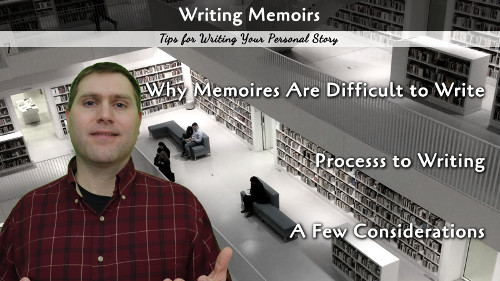Writing Memoirs can be both rewarding and challenging. Here are my reflections on writing my testimony.
We all have a story to tell, and today I want to talk about the process I underwent to write my testimony. I found it to be a challenging book to write, but it will also be rewarding for me and my readers. The challenges will certainly be outweighed by the rewards, but we will start with why memoirs are more difficult to write than other stories.
Four Reasons Memoirs Are Harder to Write
- Digging Through Your Past - The first reason was that it takes time to dig through your history. In my case, I have journals going back to high school, so I needed to spend extra time reading through those memories to regain some perspectives that I had otherwise forgotten about. While this took a while, it was deeply rewarding to remember how far I had come. This also fueled new memories to expand on in the writing process.
- Determining What's Most Important - We all have challenging stories to tell, and we need to be careful to identify the most important lessons we can teach. In my case I focused on five principles that I used as a framework to weave the stories of my life between. Once we outlined the key points, I sorted out all the details to see which ones would make the best story.
- Determine What to Leave Out - Just as important as figuring out what to include, you will likely have too much detail. Some things need to be excluded, even your favorite life story (if it isn't relevant to your key lessons). For me, the extra essays helped me tune in to the most important details to focus on, which made identifying the extra content easier to do.
- Understanding Past Hurts - This step won't apply to everyone, but many people who want to share their challenges in life have been through some rough stuff. Learning to understand and come to terms with your past hurts is an important step to growing, and it is likely the reason people will want to read your book to begin with. Recovering from past pain helps to encourage others to do the same.
Now that we have come to grips with the challenges we will be bound to face, we should also talk about the process used to write memoirs, including how to structure them.
Process to Writing Your Memoirs
The first step I took to writing down my story was to write a lot of essays. I usually write essays to organize my work, but this time I spent a significant amount of time working on those essays. I started with bullet points, expanded to essays, and effectively wrote each chapter out on paper with a pen before typing a single word. This greatly increased my writing time, but I also think it may have honed in on better writing in the end. I guess I will know for sure when the book is done.
Second, I needed to have a more detailed outline than I usually write. I started this book with a rough outline, but by the time I sat down to work on the first chapter I realized I wasn't nearly as organized as I should have been. I worked on a new outline and created it more detailed than I had in the past. This sufficed for an excellent bullet point list to create an essay for each chapter.
Finally, we should talk about structure. That is to say, we need to consider how the timeline of our memoirs will be presented. I identified three general ways to write your story.
- Linear - This is to start at the very beginning of your life and write it in the same order that you lived it.
- Linear by Topic - To write essentially linearly, but with a focus on a specific topic or lesson. This is how I chose to present my testimony: a linear timeline following five core lessons.
- Reflective - To write from your future self telling the story (Stand by Me, Forrest Gump)
With my difficulties out of the way and my timeline determined, there are two final considerations: how will you write the story.
- Fictional Rendering - This method is being recommended by some agents. The idea is to take your story that you want to tell and add the true elements into an otherwise fictional tale.
- Factual Autobiography - This method is a totally factual telling without embellishing the story. This is the method I chose to use to write my story.
Hopefully these tips have given you something to think about as you prepare to write your story.


